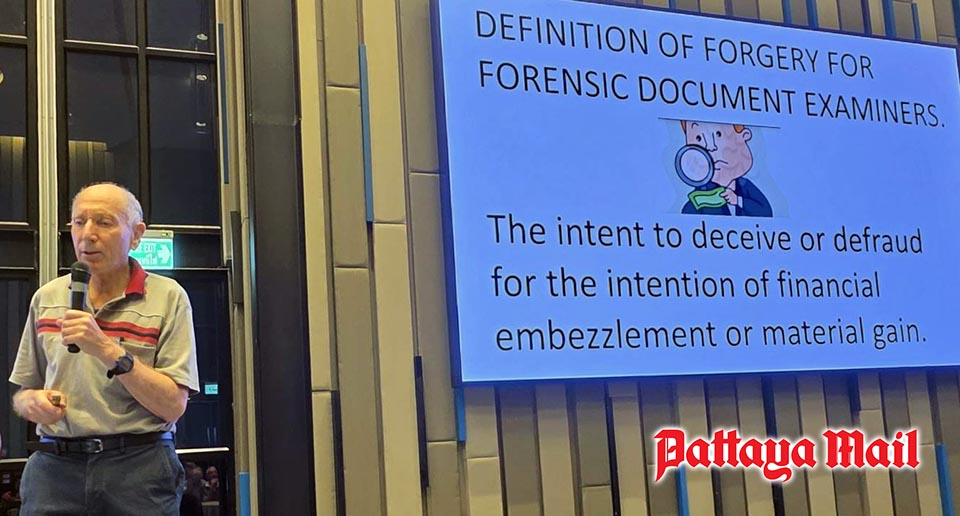Forensic Handwriting Expert Shares Insights on Forgery Detection at PCEC
Handwriting expert Mike Maran gives another informative and interesting talk to the PCEC about forgeries and the technical aspects used to identify them.
PATTAYA, Thailand – On July 16, 2025, forensic handwriting specialist Mike Maran delivered a presentation to the Pattaya City Expats Club (PCEC), shedding light on the intricate world of forgery and simulation in handwriting. Drawing from his extensive experience in New Zealand, Mike shared real-world cases and expert techniques used to detect forgery, emphasizing the critical role of forensic handwriting examination in safeguarding legal and financial interests.
Mike began by explaining that forgery in handwriting is often driven by financial motives, involving documents such as wills, contracts, insurance claims, checks, immigration applications, and tax returns
One of the key points Mike discussed was the concept of simulation, which involves freehand imitation of writing or signatures. He explained that this requires fluency and natural variation due to cognitive motor functions. Mike also touched on common forgery methods such as tracing and electronic manipulation, including cut-and-paste techniques.
Mike provided several examples of common document types subject to forgery. Wills, he noted, are frequently questioned, with microscopic analysis revealing subtle differences in line quality and pen pressure that distinguish genuine from forged signatures. Financial documents, such as checks, are also prime targets for forgery. Mike shared a case involving an elderly gentleman with dementia whose checks were altered by a caregiver for excessive amounts.
Legal and employment disputes often involve forgery as well. Mike described a case where a lawyer forged a client’s signature on a bank cash request and another where parties denied signing employment agreements, necessitating forensic comparison of signatures. He emphasized the importance of having multiple known exemplars to assess natural signature variation.
Mike also discussed the challenges of verifying signatures on photocopies rather than originals, which can limit the conclusiveness of forensic opinions. He outlined various forensic examination techniques, including the preference for original documents to observe pen pressure and line quality, the use of comparison standards with multiple known signatures, and the cautious framing of opinions on a scale from inconclusive to highly probable.
Human factors and signature variability were another focal point of Mike’s presentation. He explained that signatures naturally vary due to cognitive and physical factors, including age-related deterioration. Identical signatures, he noted, are suspicious and usually indicate forgery or copy-pasting.
Mike also addressed the impact of language and cultural differences on handwriting. New immigrants, he explained, often exhibit signature variations influenced by their first language and writing systems. Forensic examiners must consider these factors and may consult interpreters for non-English scripts to accurately assess handwriting authenticity.
In conclusion, Mike underscored the ongoing challenges and importance of forensic handwriting examination in legal and financial contexts. Despite technological advances and emerging AI tools, expert human analysis remains essential to interpret subtle handwriting traits and provide prudent opinions.
After the presentations, MC Ren Lexander brought everyone up to date on upcoming PCEC events and conducted the Open Forum where the audience may ask questions or make comments about Expat living in Thailand, especially Pattaya. For more information about the PCEC and their meeting location, visit their website at https://pcec.club. To view a video of Mike’s presentation, visit the PCEC’s YouTube Channel at https://www.youtube.com/watch?v=n2dFV6mOTYw&t=11s.



